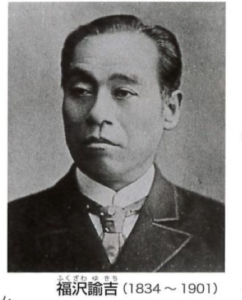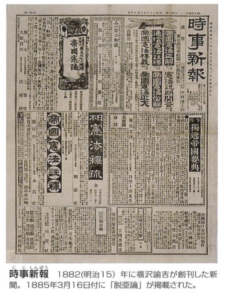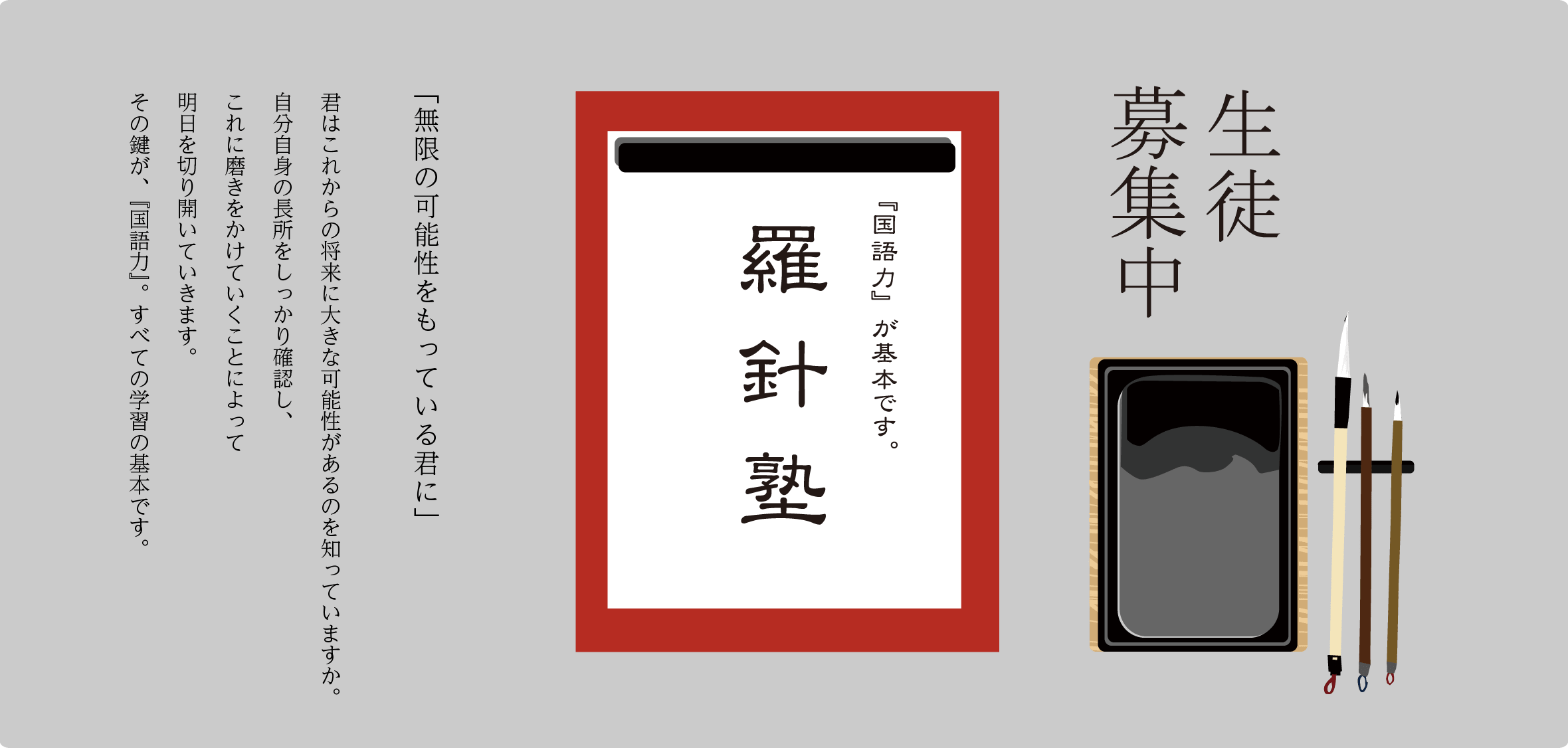長崎市五島町にある羅針塾 学習塾・幼児教室 https://rashinjyuku.com/wp では、インフルエンザが流行していることもあり、塾生の健康管理には普段から気をつけています。より良く学ぶ為には万全の体調を維持する必要があります。
さて、
平成三十年二月九日からKoreaで始まる冬季オリンピックは、北朝鮮の核と長距離弾頭弾の開発がもたらす日・米とChina・南北朝鮮間の緊張のさなかで行われます。百年以上も前に、日本・朝鮮・清(China)との関係を、福澤諭吉が喝破していた通りの展開が現在も進行し、日本の国難は続いています。
そこで、この「英語と歴史を同時に学ぶ」の1で一部ご紹介した福沢諭吉の『学問のすすめ』と「脱亜論」の続きです。
『新しい歴史教科書』(新版・中学社会)(自由社)英訳シリーズ その8-第4章「近代の日本と世界(I)―幕末から明治時代」http://www.sdh-fact.com/CL02_2/Chapter%204%20Section%203,%204.pdf からの引用です。

Saving Japan from the “wildfire”
In the same line of thought, Fukuzawa hoped that Japan’s neighbors in Asia, Korea and Qing China, would also assert their independence in order to resist Western imperialism. He believed that all three nations would have to help their people accept enlightened values, quickly modernize their societal structures, and then join forces to defeat the encroachments of the Western powers. Contrary to Fukuzawa’s high expectations, events did not transpire in the way he had desired.
From the Opium War and onwards, China was repeatedly invaded by the Western powers, including Great Britain, France, and Russia, but it hesitated to modernize its political and social structures. Under the tributary system, Korea stagnated under Chinese tutelage and proved unable to institute the reforms needed to modernize its national defenses even as Russian power bore down on the Korean Peninsula from the north. Indeed, some Chinese and Korean leaders scorned Japan’s policy of “civilization and enlightenment” as “aping the West”.
Fukuzawa refused to simply turn a blind eye to the problems of Japan’s Asian neighbors. He explained the situation as follows:
“Europe’s current advance into Asia is just like a spreading wildfire. Japan cannot save itself from the wildfire just by building its own home out of stone. As long as the other homes in the neighborhood are built of cheap wood, Japan will have no chance of escaping the spreading flames.”
Thus, because Japan, Korea, and China were all homes on the same street, Japan would only be safe once it had ensured that the other two homes were also built of stone, if necessary by applying a degree of coercion towards their owners. This was the analogy Fukuzawa chose to illustrate Japan’s urgent need to modernize not only itself, but its neighbors as well.
「火事」から日本を守るには
福沢は、同じ考えのもと、お隣の朝鮮も清(中国)も、外国に侵されない、独立した国になることを望みました。東アジアの3国が、自国の国民を啓蒙するとともに、社会の仕組みを一日も早く近代化し、互いに手を取り合って西洋のアジア進出に対処していかねばならない、と考えたのです。しかし、現実は、福沢の望み通りには進みませんでした。
アヘン戦争以後の清は、イギリス、フランスロシアなど西洋列強によって国土を侵されてきましたが、政治や社会の仕組みの近代化が立ち遅れていました。朝鮮は、その清を宗主国とする冊封体制にとどまっていました。南下政策をとるロシアが朝鮮半島を狙っていることに対しても、近代的な国防の仕組みを十分につくることができませんでした。また、日本が開化政策をとっていることを、「西洋かぶれ」と反発した勢力もありました。
福沢は、このような隣近所の国々のあり方を見過ごすことができませんでした。彼はその状況を以下のように説明しました。
「いま西洋が東洋に迫るその有様は、火事が燃え広がるのと同じである。この火事から日本という家を守るには、日本の家だけを石造りにすれば済むというものではない。近隣に粗末な木造家屋があれば、類焼は免れないからである。」
日本・朝鮮・清という、お互いに隣り合う家屋の安全のためには、隣の家の主人を半ば強制してでも我が家に等しい石造りの家を作らせることが必要である。これが福沢の考え方でした。

時事新報 1882(明治15)年に福沢諭吉が創刊した新聞。1885年3月16日付に「脱亜論」が掲載された。
Korea’s failure to modernize and Leaving Asia
Within the Korean government, some politicians understood the gravity of the crisis their country was facing. One of them was Kim Ok-kyun. Fukuzawa was in contact with Kim Ok-kyun and other members of his Enlightenment Party, and he aided their efforts to have the Korean government pursue a pro-modernization agenda.
Fukuzawa also urged that all Koreans be educated to read and write in hangul, a Korean alphabetic script that was not widely used, despite having been invented by Korea’s ruling Choson dynasty in the fifteenth century.
Nonetheless, there were also many ultraconservative political figures in the Korean government who opposed the Enlightenment Party and sought to thwart their policies of modernization. In addition, China exerted military pressure on Korea to prevent it from breaking free of its tributary status and interfered with Korea’s progress towards modernization. In 1884 (Meiji 17), Kim Ok-kyun and the Enlightenment Party attempted to seize power with Japanese support in the hopes of completing the modernization of their country. This event, known as the Kapsin Coup, proved short-lived when the Chinese government declared its intention to “protect” its tributary and had its armed forces quickly crush Kim’s uprising.
The failure of the rest of East Asia to modernize did much to disillusion Fukuzawa. Immediately after the Kapsin Coup, he penned the essay Leaving Asia, which expressed his new way of thinking that, “Our country can no longer hope to resist the advance of the West by joining forces with Korea and China as they are now. From now on, we will have no choice but to work with the Western countries and play by their rules.” Regardless, Fukuzawa did not adopt an uncompromising stance right away. He continued to insist afterwards in his speeches and writings that China and Korea would experience a great awakening.
朝鮮近代化の挫折と「脱亜論」
朝鮮政府の中には、自国の置かれている危うさに気づいている政治家もいました。その一人が金玉均でした。福沢は、金玉均たち開化派に働き掛け、朝鮮政府が近代化政策を進めるのを支援しました。
朝鮮王朝によって15世紀に発明されながら十分に普及していなかったハングル文字を、国民教育のために使用することを勧めたのも福沢でした。
しかし、朝鮮政府の中には、開化派に反感を抱く守旧派の政治家たちもたくさんいて、開化派が進めようとする近代化政策に反対しました。朝鮮を属国と見ている清は、朝鮮に軍事的な圧力をかけ、朝鮮の近代化政策に干渉しました。1884(明治17年)、金玉均たちの開化派は、日本を後ろ盾として、国の近代化を図るためのクーデターを起こしました。清は「属邦保護」を名目に干渉し、軍隊によって鎮圧しました(甲申事変こうしんじへん)。
近代化が十分に進まない東アジアの状況に対して、福沢はなかば絶望しました。そして、甲申事変のすぐあとに、「脱亜論」という論文を発表し、「我が国は、もはやこのような朝鮮や清と連携して西洋の進出に対抗することはできない。これからは、西洋諸国のやり方に従って、付き合うしかない」と主張しました。しかし、すぐに強硬な姿勢をとったわけではなく、その後も朝鮮や清の覚醒を期待しつつ、粘り強く言論活動を続けました。
・・・「進取の気象」に富む日本の先人達は、困難な状況でも希望を失わず、前向きに物事に取り組んできました。現在の日本を取り巻く状況も、Chinaや北朝鮮、ロシアの「核」の脅威が厳として存在する以上、日本は存亡の危機に瀕しています。七〇年以上の見せかけの「平和」に狎れ、所謂「平和ボケ」から日本人自身がいち早く脱却しなければ、福澤諭吉が危惧していた「脱亜論」で言う所の「支那・朝鮮」と同様の苦しみを、子供達が味わうことにもなりかねません。その為にも、学校で学ばない「近現代の歴史」を学ぶ必要があります。








